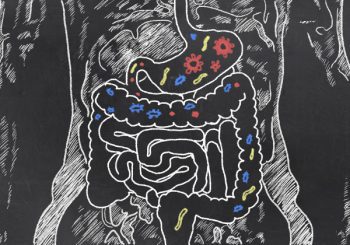Guest Writer for Wake Up World
I can think of least 50 people right now who would list digestive issues as their number one health complaint. Whether it is IBS, an ulcer, heartburn, bloating, unexplainable food intolerances or just a “sensitive gut,” it seems like everybody is dealing with some kind of digestive distress these days.
Have you ever stopped to consider why?
Sadly, what a lot of people don’t know is that seemingly “normal” digestive upset may be a sign of a more serious issue: leaky gut. This term may sound strange, but it can also be serious.
[pro_ad_display_adzone id=”110028″]
I am so proud of our efforts at TTAC to empower YOU with your health. And knowing the whys, hows, and consequences of leaky gut are so important to continue to learn about.
The Importance of a Healthy Digestive System
In a nutshell: your digestive system is VITAL for your overall health. It is within your digestive system where most of the nutrients you take in are absorbed. In addition, your upper gastrointestinal tract contains most of your entire body’s immune system cells – roughly 80%! Scientists have begun to refer to the gut as your “second brain.” The digestive system also interacts with hundreds of hormones in the body by way of beneficial bacteria.
The health of the lower part of your GI tract is just as important as the stomach and small intestines. You can think of your colon as having one main function: to dispel waste. When the digestive system is weak, such as in the case with leaky gut, the waste will not “move along” in the right way.
Imagine what happens when your toilet or sink gets clogged. It’s not a nice picture to paint, but it is basically the same thing that can happen to your lower GI when it becomes “clogged.”
The result of poor upper and lower intestinal function is leaky gut.

What is Leaky Gut and Why Is It So Common?
Leaky gut is a specific condition that occurs when microscopic holes form in the digestive tract. It is sometimes called intestinal permeability. Here is how it works.
The intestines are protected by a layer of specialized cells called epithelial cells. These cells are linked together by tight junction, or TJ, proteins. TJ proteins on the inner walls of your intestines are the “gatekeepers.” They decide what is allowed to pass between the digestive system and the bloodstream.
In healthy intestinal environments, dozens of different kinds of TJ proteins help to monitor what goes into the bloodstream from the digestive system, such as vital nutrients, and what stays out, such as toxins that need to be excreted.1
When a person has leaky gut, tiny particles that should not get into the bloodstream are able to pass through. This process inevitably leads to acute inflammation. Adding fuel to the fire, the immune system goes into overdrive in the presence of pathogens in the bloodstream. This can lead to immune overstimulation, or autoimmunity.
Leaky gut symptoms may be similar to other gut-related conditions and can include:
- Gas
- Bloating
- Stomach cramping
- Food sensitivities
- Headaches + minor aches and pains
- Mood swings and low energy
The Role of Good and Bad Bacteria
The health of your gut in general really comes down to what kind of bacteria live there and how much of each kind there is. I was blown away when I learned about the importance of proper gut balance from Dr. Josh Axe and others.
Did you know that there are over 100 trillion microorganisms in your gut right now?2 This includes bacteria but also yeasts, parasites, fungi and other tiny living things. Together, they all make up what scientists call the “gut microbiota.”3
According to researchers at the University of Illinois, among others, the total number of cells that make up the gut microbiome population within you outnumber the number of strictly “human” living cells.4 The microbiota also accounts for about 35-50% of the total volume of your colon.
We can’t really analyze the health of other mechanisms in the body without taking gut health into consideration. For example, the bacteria in your gut plays a huge role in hormonal health, including estrogen levels.5 Once estrogen circulates in the body, it eventually reaches the liver where it becomes inactive. Inside a healthy body, this inactivated estrogen will make its way to the intestines where it will be excreted in the stool. If a person has too much bad bacteria in the gut, however, this bacterium can reactivate the estrogen and cause a condition called “estrogen dominance.”
As far back as the 1980s, modern research began putting two and two together when it comes to gut health and the overall health of the body. A 1989 report in the Journal of Applied Bacteriology determined that there is “good evidence that the complex microbial flora present in the gastrointestinal tract of all warm-blooded animals is effective in providing resistance” to many conditions.6
Microbiome Diversity Equals Health
Just like in any community, there are “bad guys” and “good guys” in the diverse world of your gut microbiota. Your gut actually needs “the good, the bad and the ugly” to create a vibrant, diverse community. Part of the “job” of good gut bacteria is to hunt down and snuff out the bad guys like certain strains of E. Coli and Staphylococcus. These actions actually teach the immune system how to operate.7 “Gut microbiome diversity” is vital for optimum digestive health as well as the health of your entire body.
Of course, there can’t be too many pathogenic bacteria in the gut, which is often the case for so many people .“Gut dysbiosis” is a term used by scientists to denote digestive system bacteria imbalance that can have negative side effects down the line, including poor nutrient absorption.8
Investigations conducted at the University of British Columbia and others have found that gut microbiota imbalance, or dysbiosis, can lead to conditions affecting the heart, the immune system and the metabolism.9 The National Institutes of Health state that roughly 40% of the U.S. population suffers from digestive system-related symptoms; many of these are related to dysbiosis.10 Because of these and other statistics, some researchers believe that gut dysbiosis is one of the major worldwide epidemics of our time.
How to Heal Leaky Gut: 7 Behaviors to Avoid
Researchers used to think that the type and number of microbes in the gut was set at birth and that was that. But now we know that we have the ability to influence what our “digestive community” looks like and how it behaves. Indeed, we can heal gut dysbiosis and leaky gut through how we live our lives and the kinds of foods we eat.
These are seven basic factors that can contribute to leaky gut in particular:
#1. Not Enough Probiotics
Probiotics come from the foods we eat. According to the National Institutes of Health National Center for Complementary and Integrative Health, upping probiotic content in your gut either through supplementation or consuming probiotic-rich foods can help with allergy disorders, liver conditions, and even the common cold.11
Fermented products such as sauerkraut and kefir are great sources of probiotics. In fact, the power of fermented foods was first discovered by Nobel Prize-winning Russian scientist Ilya Metchikoff when he investigated the hardy health of rural cultures in Russia and Bulgaria over 120 years ago.12 What was their secret to longevity and vibrant health? High amounts of regionally-produced, organic fermented milk, or kefir.
Metchikoff went on to discover that a healthy number of good bacteria, or probiotics, in the gut can improve intestinal pH and prevent “auto-intoxication”– literally “self-poisoning” caused by the accumulation of toxic gases within the digestive tract.
#2. Not Enough Prebiotics
Once probiotic microorganisms are doing their thing to help your body, they have to eat to survive as well. Nutrients for probiotic bacteria come in the form of certain kinds of fibers called “prebiotics”.13 Vegetables containing these fibers include:
- Artichokes
- Asparagus
- Garlic
- Onions
- Leeks
- Dandelion greens
#3. Too Much Sugar, Too Many Carbs
A key lifestyle choice that is guaranteed to exacerbate leaky gut is following the “Standard American Diet,” or SAD. The main characteristic of a SAD diet is eating high amounts of sugary foods as well as high-carbohydrate foods, like pastas, breads, and alcohol. These foods quickly convert into glucose in the body and this can feed pathogenic bacteria and fungi, especially Candida Albicans. In fact, Candida yeast infections and leaky gut may be intricately linked, according to a 2018 Italian study.14 In advanced stages of Candida infection, the yeast grows roots called hyphae, which lodge themselves along bowel walls. The hyphae spread the cell walls apart, allowing harmful micro-molecules to pass into the bloodstream.
#4. Toxic Overload
Toxins come in many forms in today’s world, and toxic overload is a huge contributor to promoting gut imbalance, gut dysbiosis, and leaky gut. One sneaky way toxins can get into your system is through drinking dirty tap water, which may contain chlorine and fluoride as well as pathogens and drug waste that can all disturb flora balance. Other sources of toxic overload include:
- Chemical Pesticides
- Hormonal drug and antibiotic residue from commercial produce and meat products
- Environmental toxins (including mold in the home)
- Exposure to EMFs
#5. Too Many Antibiotics
Antibiotics are one of the great medical discoveries of our time. They have saved thousands of lives since they arrived on the scene. Today, however, modern doctors dish out heavy-dose antibiotics with wild abandon. Antibiotics mean “anti-life.” They do not discriminate in which kinds of bacteria they kill; they destroy the bad with the good. Not supplementing with probiotic-rich foods and even with probiotic supplements while you are on antibiotics can wreak havoc on your digestive system. Use antibiotics sparingly and only when absolutely necessary.
#6. Gluten
Gluten is what makes foods ingredients “stick together,” such as bread doughs and many sauces. Gliadin is the substance within the gluten molecule that many people respond to negatively.15 Consuming gluten products, such as breads, pastas and many processed foods, has become problematic for an increasing number of individuals. Gluten sensitivity and gluten can lead to leaky gut over time in those who have just a mild sensitivity. The best way to see if you are sensitive to gluten is to stay away from it for a while and see if your digestive distress improves.
#7. Vaccines
Infants are born with very weak immune systems. For the first several weeks after birth, almost all of a baby’s immunity is passed on from the mother. But this suppressed immune response is important for the child to develop healthy gut flora, the foundation of a strong immune system.16
But toxic adjuvants in vaccines, like mercury and aluminum, create inflammation and put the young immune system on defense. This prevents healthy bacteria from getting in, which can permanently and negatively affect childhood gut health and immune response. Without these important bacteria, our children can develop metabolic disease, immune disease, and allergies.
These seven causes of leaky gut are really just the tip of the iceberg. Other factors that can contribute to leaky gut (or make it worse) include eating GMO foods, consuming artificial sweeteners and leading a high-stress lifestyle.17,18,19
So, What’s In a Leaky Gut Diet?
Be sure to add plenty of gut friendly foods into your diet including bone broth, fermented foods, healthy fats like coconut oil and avocados, and apple cider vinegar.
More than just eating right, we recommend supplementing to get everything you need. When choosing a probiotic supplement, be on the lookout for these five things:
- Soil-Based Organisms and Shelf-Stable: Make sure your supplement has soil-based probiotics and is shelf-stable, aka no refrigeration needed.
- High CFU Count: Choose a brand that has at least 25 billion to 50 billion probiotics per serving.
- Strain Diversity: Select a probiotic supplement that has 5+ probiotic strains.
- Survivability: Look for strains of Bacillus coagulans, Saccharomyces boulardii, Bacillus subtilis, and other cultures or formulas that have hardy probiotics that can make it to the gut and are able to colonize.
- Prebiotics: To support the growth of probiotics once they get into your system, be sure that prebiotics are included.
Take Control of Your Gut Health and Take Control of Your Life!
The bottom line is that you can heal your gut!
I’ve seen it in many people around me and I’ve experienced it myself. The first step is knowing the importance of digestive health and what causes intestinal flora imbalance, gut dysbiosis, and leaky gut in the first place. That way you can avoid the pitfalls made by thousands who are still in the dark about gut health and you can start to enjoy life again.
There are so many changes in both your body and brain when you start eating and living for your health. Moods stabilize, aches and pains go away, the pounds shed, and energy returns. If you’re new to taking care of your gut, you may be wondering what any of this has to do with helping your gut get “back online.” But believe me… it absolutely does!
Sources:
- 1. Regulation of Tight Junction Permeability by Intestinal Bacteria and Dietary Components
- 2. Role of the gut microbiota in health and chronic gastrointestinal disease: understanding a hidden metabolic organ
- 3. What are the gut microbiota and human microbiome?
- 4. The physiological relevance of the intestinal microbiota–contributions to human health.
- 5. The Intestinal Microbiome and Estrogen Receptor–Positive Female Breast Cancer
- 6. Probiotics in man and animals.
- 7. How immune system peacefully co-exists with ‘good’ bacteria
- 8. Dysbiosis of the gut microbiota in disease
- 9. Diet-Induced Dysbiosis of the Intestinal Microbiota and the Effects on Immunity and Disease
- 10. Common digestive problems – and how to treat them
- 11. Probiotics: In Depth
- 12. Ilya Mechnikov Biographical
- 13. Fiber and prebiotics: mechanisms and health benefits.
- 14. IL-9 and Mast Cells Are Key Players of Candida albicans Commensalism and Pathogenesis in the Gut.
- 15. Does Gluten Cause Leaky Gut Syndrome?
- 16. The Impact of Vaccination on the Immature Human Immune System
- 17. Intestinal and Peripheral Immune Response to MON810 Maize Ingestion in Weaning and Old Mice
- 18. Artificial sweeteners induce glucose intolerance by altering the gut microbiota.
- 19. Regulation of the stress response by the gut microbiota: Implications for psychoneuroendocrinology
Originally published at The Truth About Cancer and reproduced here with permission.
About the Author:
Charlene Bollinger is a devoted Christian, happily married wife, joyful mother of 4 beautiful home-educated children, health freedom advocate, and co-founder and CEO of The Truth About Cancer. She is a former model and actress, fitness buff, and lover of healthy food and living. After losing several family members to conventional cancer treatments, Charlene and Ty learned the truth about cancer and the cancer industry, working together tirelessly to help others to learn the truth that sets them free to live healthy, happy lives.Charlene speaks at many conferences and is a guest on various health-related radio shows helping people discover that cancer does NOT have to be a death sentence. Together, they host a biweekly internet news program: TTAC Global Health News.
For more information, visit:
[pro_ad_display_adzone id=”110027″]







